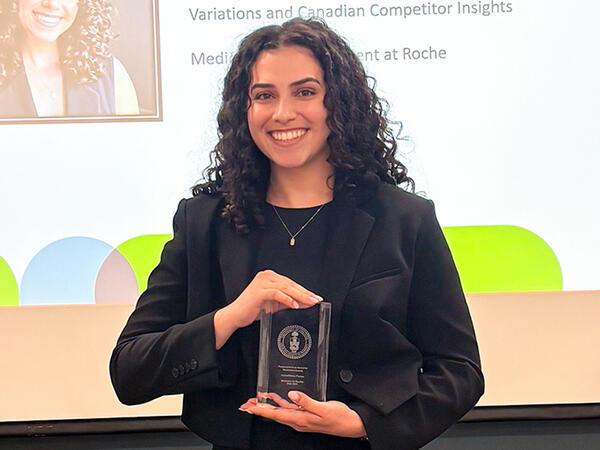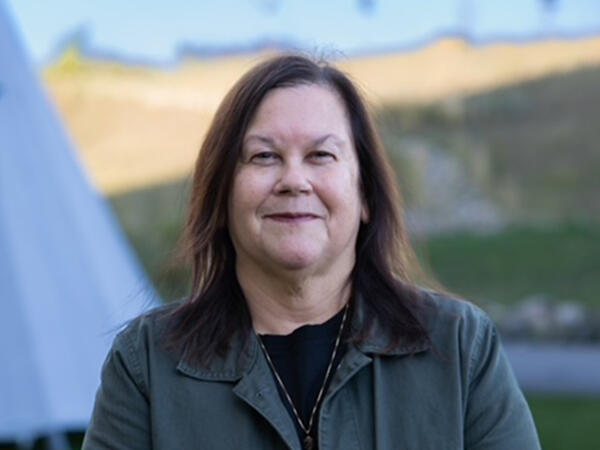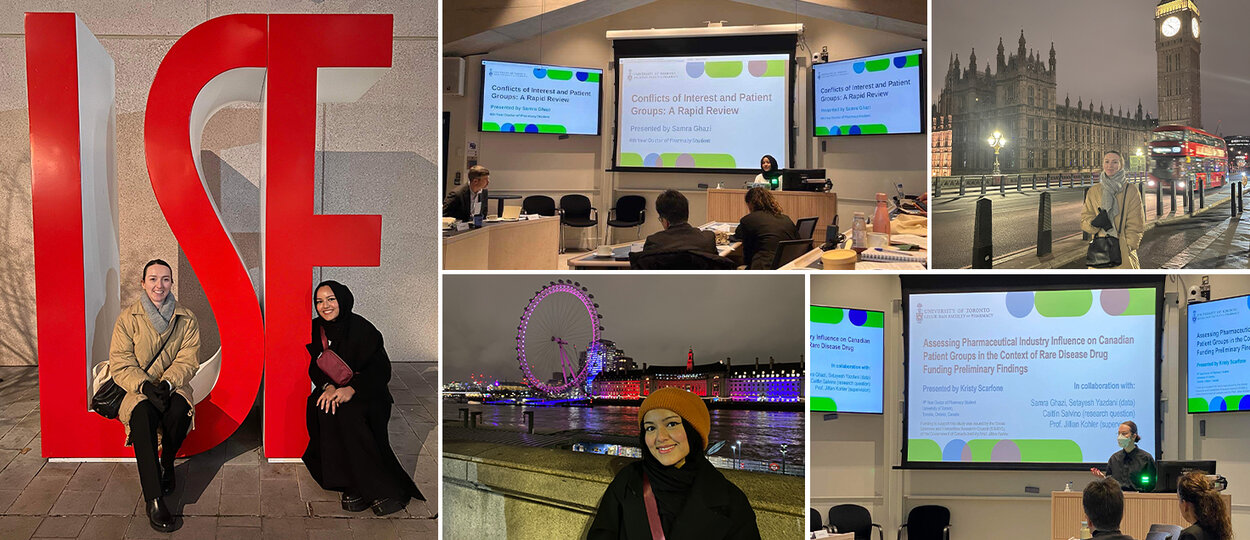Two students in the Doctor of Pharmacy (PharmD) program at the Leslie Dan Faculty of Pharmacy presented at an international workshop in January, highlighting their research examining transparency in the relationships between health organizations and pharmaceutical companies.
Kristy Scarfone and Samra Ghazi presented their team’s work at the London School of Economics and Political Science (LSE) after completing a research-focused advanced pharmacy practice experience (APPE) rotation with Jillian Kohler, professor at the Leslie Dan Faculty of Pharmacy.
“Our APPE rotation was unique in that we got to do research that really does have global impact. It’s meaningful work, and it was very rewarding to present it at an international workshop,” says Ghazi. “Being able to apply a global context to our work and see how different policies can affect health care in that global setting was a really great experience.”
Scarfone and Ghazi took a third-year course in global pharmaceutical policy, taught by Kohler with Andrea Bowra as teaching assistant, and became interested in global health and pharmaceutical policy. They each decided to pursue the Certificate in Global Studies in Pharmacy as part of their PharmD degree.
In October 2023, they both started a research APPE rotation with Kohler, whose research focuses on global access to medicines, including issues related to anti-corruption, transparency and accountability in the pharmaceutical sector. As a goal for the rotation, Kohler informed them that they could apply to present at an upcoming workshop at the London School of Economics on conflict of interest and corruption in the health sector.
In separate projects, Scarfone, Ghazi, and collaborators examined relationships between patient organizations and other healthcare stakeholders, mostly pharmaceutical companies, and whether there is potential for conflict of interest for these organizations. In both projects, their preliminary results suggest that there is very little transparency in this sector. This work is part of a project that Kohler is leading that is funded by the Leslie Dan Faculty of Pharmacy’s Clinical and Social Administrative Pharmacy Award.
“We wanted to see if there is a potential risk of bias or influence of the pharmaceutical industry in patient organizations and their activities. We’re not necessarily saying this is happening, but we were looking at whether there is potential,” says Scarfone. “It’s more of a call that there should be more transparency and awareness of links between patient organizations and pharmaceutical companies.”
Students gain experience in presenting to international audience
With their abstracts accepted, Scarfone and Ghazi – along with Bowra, who presented her PhD research that Dr. Kohler is supervising on the global health actors involved in responding to the harms caused by Purdue Pharma and oxycontin – presented their team’s research at the three-day workshop hosted by the LSE’s department of health policy.
A few dozen experts and students from organizations and universities around the world attended the workshop, which was meant to foster collaboration and knowledge exchange among the attendees.
“It is important for students to learn about cutting-edge research and also to have the opportunity to learn how to present their own work in international contexts.”
“It is important for students to learn about cutting-edge research and also to have the opportunity to learn how to present their own work in international contexts,” says Kohler.
The LSE workshop provided valuable opportunities for Ghazi and Scarfone to present and to learn from experts in the field. Ghazi, Scarfone, and Bowra greatly appreciated that Kohler supported them in this immersive learning experience.
“We were able to network with people who are involved in this field, have a lot of knowledge, and have done tons of research on these topics,” says Ghazi. “We received valuable feedback that we could incorporate into our work and build on it and continue this research down the line.”
Exposure to global health and pharmaceutical policy issues through the Certificate in Global Studies in Pharmacy and APPE research has helped shape their perspectives and understanding of how policies around the world are connected. They plan to bring this perspective and learning to their pharmacy practices and potential future research.
“We’ll often think about what is being done in Ontario or Canada, but this experience has taught me that it’s important to broaden the scope and look at what is being done across the globe and examine the similarities and differences,” says Scarfone. “Having students think about global implications of policy, transparency, and corruption is integral to understanding good policy decisions, especially in the pharmaceutical system, which is global in scale.”
More News
Image

Research team aims to co-design diabetes and dementia support programs that meet community needs
Network for Health Populations funding will support collaborative project to improve health outcomes for immigrant communities in Mississauga.
Read More
Image

Pharmaceutical industry resident finds growth in new challenges
Pharmaceutical Industry Residency Program Award recipient AnnaMaria Passas gained new skills through residency and research project to improve marketability in industry.
Read More
Image

Pharmacy alum sees change in acceptance of Indigenous cultures in health care
During Deborah Emery’s 40-year pharmacy career, she provided care in Sioux Lookout, Thunder Bay and Manitoulin Island.
Read More
